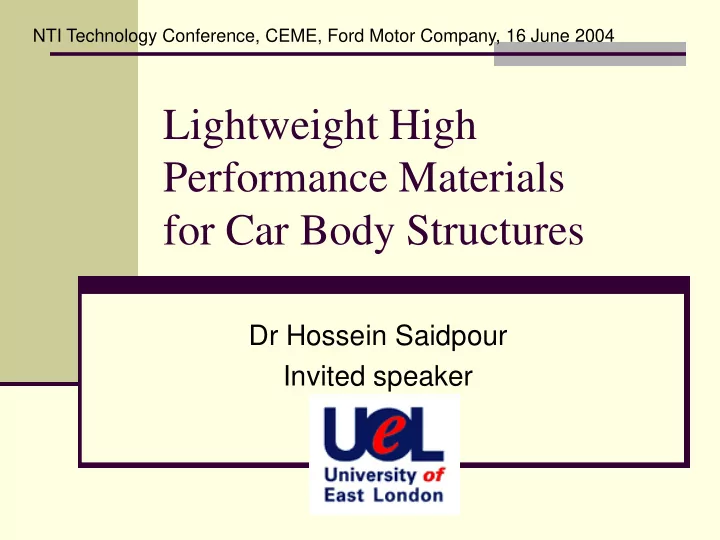

NTI Technology Conference, CEME, Ford Motor Company, 16 June 2004 Lightweight High Performance Materials for Car Body Structures Dr Hossein Saidpour Invited speaker
Presentation Outline Introduction Why lightweight high performance materials? Techniques to reduce car weight Existing materials and structures Potential for Fibre Composites Structural analysis Conclusion
Reasons for lightweight Materials Environmental issues Improve performance Improve production methods Reduce fuel costs Reduce total cost of the car
To reduce vehicle weight Material lightweight Structural lightweight Optimising of construction construction production process -Tailored blanks / patchwork - Reduced number of spot -Unreinforced and inforced welds plastic - Profile / tubular structure - Light joining techniques - Aluminium Magnesium - Optimised joint design - New manufacturing - High strength Steels - New structure and complex processes ( e.g. strategic - Metal foams hydroforming)
Materials used in a mid-sized car
Steel Unibody (BMW 7er Series) DC06 (120 MPa) DC04140 25tE220 25tE300 25tE380 25tE420 CP800
Multimaterial Unibody (Aston Martin Vanquish) Outer skin: hot worked aluminium sheet Centre tunnel, A-pillar and roof frame: CFRP Side sections, boot floor, crash structures: GRP
Aluminium Space Frame (Audi A8) Cast Parts Extruded profiles Sheets
Steel Space Frame
Magnesium Space Frame (VW)
Composite materials
Hybrid Composites Intraply carbon-kevlar hybrids G F E Fixing the weft style, and changing the warp style E=CKA3X2 (43% c) G=CKA1X2 (50% c) F=CKA2X2 (66% c) H=CKA4X2 (73% c) H
Application of composite materials
Application of different materials Aluminium engine mounts CFRP longitudinal member CFRP Cell
Structural analysis Accurate materials models are essential for the development of realistic deformation simulations Computer modelling of bumper
Structural testing Deformation study of Audi A8 side member
Conclusions For optimum vehicle weight choice of materials, structures, manufacturing processes must be considered. The future is bright for composite materials.
Recommend
More recommend